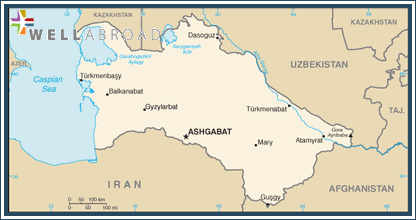|
MOST RECENT ALERTS
There's no recent alert.
|

|
|||||||||||||||
| COUNTRY OVERVIEW | ||||||||||||||||
|---|---|---|---|---|---|---|---|---|---|---|---|---|---|---|---|---|
|
| COUNTRY GENERAL INFORMATION | |||||||
|---|---|---|---|---|---|---|---|
| Language: |
Turkmen 72%, Russian 12%, Uzbek 9%, other 7% |
||||||
| Currency: | Turkmen Manat (TMM) | ||||||
| Predominant Religions: |
Muslim 89%, Eastern Orthodox 9%, unknown 2% |
||||||
| National Holidays: | Independence day, 27 October (1991) | ||||||
| Economic Status: |
Turkmenistan is largely a desert country with intensive agriculture in irrigated oases and large gas and oil resources. One-half of its irrigated land is planted in cotton; formerly it was the world's 10th-largest producer. Poor harvests in recent years have led to an almost 50% decline in cotton exports. With an authoritarian ex-Communist regime in power and a tribally based social structure, Turkmenistan has taken a cautious approach to economic reform, hoping to use gas and cotton sales to sustain its inefficient economy. Privatization goals remain limited. |
||||||
| Security: |
Ground Forces, Navy, Air and Air Defense Forces |
||||||
| US Presence: |
United States Embassy Ashgabat |
||||||
| Document Requirements: |
American citizens must have a valid passport and visa and/or letter of invitation from the Government of Turkmenistan to enter and exit Turkmenistan. To apply for a visa, all US citizens must complete an application and have a letter of invitation approved by the State Migration Service (SMS), formerly known as the State Service for the Registration of Foreigners (SSRF), in Ashgabat. An individual or organization in Turkmenistan must submit the letter of invitation on behalf of an American citizen to the SMS accompanied by a copy of the traveler's passport ID page. Each traveler’s passport must be valid for at least 6 months following the date of the application. The SMS requires at least 15 working days for approval. The US Embassy in Ashgabat does not issue letters of invitation to citizens interested in private travel to Turkmenistan. Applications for a visa can be submitted to the Embassy of Turkmenistan in Washington, DC, or directly to the SMS in Ashgabat. Under local law, a traveler with a stamped and approved invitation letter may also obtain a visa at the Ashgabat International Airport upon arrival in Turkmenistan; however, some travelers have reported difficulties with airlines not boarding passengers who only have approved invitation letters in lieu of a visa for onward travel to Turkmenistan. Travelers are strongly recommended to obtain a visa before traveling. |
||||||
| Major Airports: |
Airports: 28, Airports w/paved runways: 22 Ashkabad Airport (ASB/UTAA)
|
||||||
| Servicing Airlines: |
|
||||||
| Risks and Precautions: |
Those considering travel to Turkmenistan should take the country's proximity to regions of past and current instability into account before making any plans. The Government of Turkmenistan has designated many areas throughout the country as “restricted zones,” particularly the border areas next to Iran, Uzbekistan, and Afghanistan, the entire region of Dashoguz (including Dashoguz city), and areas of the Caspian coast. Travel to these areas by foreigners is forbidden without special permission from the Government of Turkmenistan. Turkmenistan is an earthquake-prone country. |
||||||
| Mortality Statistics: |
Infant MR total: 51.81 deaths/1,000 live births |
||||||
| Immunization Indicators: |
Required: None |
||||||
| Infectious Disease Concerns: |
Malaria risk area in Turkmenistan: Risk in southeast Mary Region and in the flood plains between the Murgab and Tedzhen Rivers. |
||||||
| Overall Quality of Medical Services: |
Medical care in Turkmenistan is limited and well below North American and Western European standards. All visitors are strongly advised to purchase medical evacuation insurance to cover costs associated with transporting them to adequate medical facilities in the event of serious illness or injury. Such travel can be expensive if undertaken under emergency conditions, and, absent this insurance, medical evacuation travel may be logistically impossible on an emergency basis. Travelers with medical conditions should consult their regular physician to determine whether travel to Turkmenistan is advisable in light of the level of available health care. Resident American citizens travel to Western Europe or North America for treatment of any serious medical condition. The U.S. Embassy maintains a list of public hospitals and English-speaking physicians in the country, however the standard of care at these hospitals cannot be considered comparable to Western standards. Basic medical supplies, including disposable needles, anesthetics, and antibiotics are often in short supply. Two private clinics have foreign medical practitioners (generally Turkish) who may be available for consultations and treatment; these clinics, however, have refused in some cases to admit patients with serious conditions, regardless of the patient’s ability to pay for treatment. Even at these hospitals, the standard of care is low compared to Western standards. Travelers requiring prescription medications should bring sufficient supplies of all necessary medications and appropriate documentation to ensure there are no problems with customs officials upon arrival.
|
||||||
| Providers in Network: |
|
||||||
| Recent Medical Threats/ Concerns/Warnings: |
Highly pathogenic avian influenza virus H5N1 has been documented in wild birds or other avian species in several of the countries in Eastern Europe. Human cases and death were reported from Azerbaijan in 2006. Avoid all direct contact with birds, including domestic poultry (such as chickens and ducks) and wild birds, and avoid places such as poultry farms and bird markets where live birds are raised or kept. For a current list of countries reporting outbreaks of H5N1 among poultry and/or wild birds, view updates from the World Organization for Animal Health (OIE), and for total numbers of confirmed human cases of H5N1 virus by country, see the World Health Organization (WHO) Avian Influenze website. |
||||||
| Communications Info: |
Calling Code: +993 |
||||||






